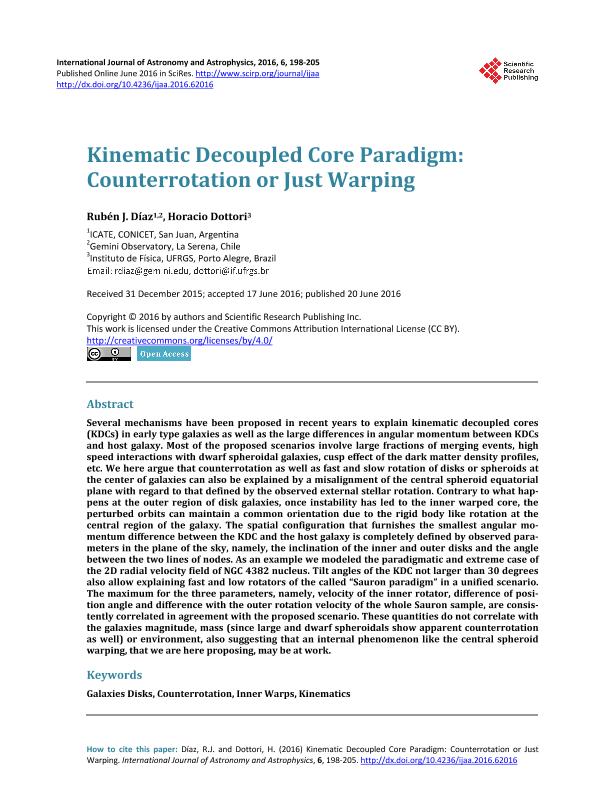Mostrar el registro sencillo del ítem
dc.contributor.author
Diaz, Ruben Joaquin

dc.contributor.author
Dottori, Horacio Alberto

dc.date.available
2018-09-28T19:20:10Z
dc.date.issued
2016-07
dc.identifier.citation
Diaz, Ruben Joaquin; Dottori, Horacio Alberto; Kinematic decoupled core paradigm: counterrotation or just warping; Scientific Research Publishing; International Journal of Astronomy and Astrophysics; 6; 2; 7-2016; 1-8; 67481
dc.identifier.issn
2161-4717
dc.identifier.uri
http://hdl.handle.net/11336/61280
dc.description.abstract
Several mechanisms have been proposed in recent years to explain kinematic decoupled cores (KDCs) in early type galaxies as well as the large differences in angular momentum between KDCs and host galaxy. Most of the proposed scenarios involve large fractions of merging events and/or interactions, dredging of dwarf spheroidal, formation and evolution of giant ellipticals, dark matter, cusps effects, etc. We here argue that counter rotation as well as fast and slow rotation of disks or spheroids at the center of galaxies can also be explained by a misalignment of the central spheroid equatorial plane with regard to that defined by the observed external stellar rotation. Contrary to what happens at the outer region of disk galaxies, once instability has lead to the inner warped core, the perturbed orbits can maintain a common orientation due to the rigid body like rotation at the central region of the galaxy. The spatial configuration that furnishes the smallest angular momentum difference between the KDC and the host galaxy is completely defined by observed parameters in the plane of the sky; namely, the inclination of the inner and outer disks and the angle between the two lines of nodes. As an example we modeled the paradigmatic and extreme case of the 2D radial velocity field of NGC 4382 nucleus. Tilt angles of the KDC not larger than 30 degrees allow also explaining fast and low rotators of the called ?Sauron paradigm? in a unified scenario. The maximum for the three parameters; name-‐ ly, velocity of the inner rotator, difference of position angle and difference with the outer rotation ve-‐ locity of the whole Sauron sample are consistently correlated in agreement with the proposed sce-‐ nario. These quantities do not correlate with the galaxies magnitude, mass (since large and dwarf spheroidals show apparent counter rotation as well) or environment, also suggesting that an internal phenomenon like the central spheroid warping, that we are here proposing, may be at work.
dc.format
application/pdf
dc.language.iso
eng
dc.publisher
Scientific Research Publishing
dc.rights
info:eu-repo/semantics/openAccess
dc.rights.uri
https://creativecommons.org/licenses/by-nc-sa/2.5/ar/
dc.subject
Galaxy Disks
dc.subject
Counterrotation
dc.subject
Inner Warps
dc.subject
Kinematics
dc.subject.classification
Astronomía

dc.subject.classification
Ciencias Físicas

dc.subject.classification
CIENCIAS NATURALES Y EXACTAS

dc.title
Kinematic decoupled core paradigm: counterrotation or just warping
dc.type
info:eu-repo/semantics/article
dc.type
info:ar-repo/semantics/artículo
dc.type
info:eu-repo/semantics/publishedVersion
dc.date.updated
2018-09-27T20:16:47Z
dc.journal.volume
6
dc.journal.number
2
dc.journal.pagination
1-8; 67481
dc.journal.pais
Reino Unido

dc.description.fil
Fil: Diaz, Ruben Joaquin. Consejo Nacional de Investigaciones Científicas y Técnicas. Centro Científico Tecnológico Conicet - San Juan. Instituto de Ciencias Astronómicas, de la Tierra y del Espacio. Universidad Nacional de San Juan. Instituto de Ciencias Astronómicas, de la Tierra y del Espacio; Argentina
dc.description.fil
Fil: Dottori, Horacio Alberto. Universidade Federal do Rio Grande do Sul; Brasil
dc.journal.title
International Journal of Astronomy and Astrophysics
dc.relation.alternativeid
info:eu-repo/semantics/altIdentifier/url/http://file.scirp.org/Html/6-4500528_67481.htm
dc.relation.alternativeid
info:eu-repo/semantics/altIdentifier/doi/http://dx.doi.org/10.4236/ijaa.2016.62016
Archivos asociados
